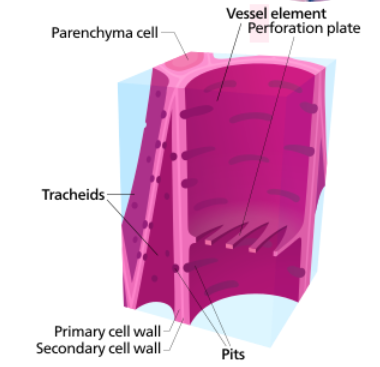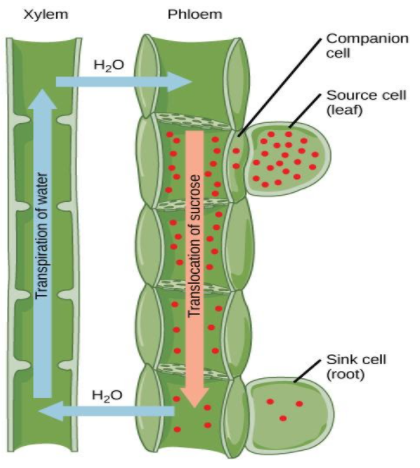
What are xylem and phloem? What are their roles?
Answer
501.6k+ views
Hint: The vascular tissues are present top the roots to the tips of the plants. Xylem and phloem are the vascular tissues present in the plant. They are the conducting tissues that play a vital role in conduction.
Complete answer:
The vascular tissue is the permanent tissue present in the plant. They are complex tissues as they are made up of different types of cells. The vascular tissues are present in the vascular plants. The vascular tissues are of two types-
Xylem- It is the conducting tissue that helps in the transport of water from the roots to all the parts of the plants. The xylem is a complex tissue that consists of four different types of cells- Tracheid, vessels, xylem parenchyma, fibres. The parenchyma is the only living cell present in these tissues. They help in the upward transport of water and minerals from the roots to the different parts of the plant. The transport requires energy.

Phloem- It is the conducting tissue that helps in transporting the food from the leaves to all the parts of the plant. They are made up of phloem parenchyma, companion cells, sieve tube elements and fibres. These are the living conducting tissues.

The major role of these tissues is the conduction of minerals, nutrients and water. They also help in providing mechanical support to the plants. The cells of the vascular bundle also have a secretory role.
Note: Xylem is made up of dead cells whereas phloem is made up of living cells. The xylem sap contains the water and other nutrients required for the growth of the plant. The phloem contains soluble sugars or carbohydrates which is produced as a result of photosynthesis.
Complete answer:
The vascular tissue is the permanent tissue present in the plant. They are complex tissues as they are made up of different types of cells. The vascular tissues are present in the vascular plants. The vascular tissues are of two types-
Xylem- It is the conducting tissue that helps in the transport of water from the roots to all the parts of the plants. The xylem is a complex tissue that consists of four different types of cells- Tracheid, vessels, xylem parenchyma, fibres. The parenchyma is the only living cell present in these tissues. They help in the upward transport of water and minerals from the roots to the different parts of the plant. The transport requires energy.

Phloem- It is the conducting tissue that helps in transporting the food from the leaves to all the parts of the plant. They are made up of phloem parenchyma, companion cells, sieve tube elements and fibres. These are the living conducting tissues.

The major role of these tissues is the conduction of minerals, nutrients and water. They also help in providing mechanical support to the plants. The cells of the vascular bundle also have a secretory role.
Note: Xylem is made up of dead cells whereas phloem is made up of living cells. The xylem sap contains the water and other nutrients required for the growth of the plant. The phloem contains soluble sugars or carbohydrates which is produced as a result of photosynthesis.
Recently Updated Pages
Master Class 11 Computer Science: Engaging Questions & Answers for Success

Master Class 11 Business Studies: Engaging Questions & Answers for Success

Master Class 11 Economics: Engaging Questions & Answers for Success

Master Class 11 English: Engaging Questions & Answers for Success

Master Class 11 Maths: Engaging Questions & Answers for Success

Master Class 11 Biology: Engaging Questions & Answers for Success

Trending doubts
One Metric ton is equal to kg A 10000 B 1000 C 100 class 11 physics CBSE

There are 720 permutations of the digits 1 2 3 4 5 class 11 maths CBSE

Discuss the various forms of bacteria class 11 biology CBSE

Draw a diagram of a plant cell and label at least eight class 11 biology CBSE

State the laws of reflection of light

10 examples of friction in our daily life




